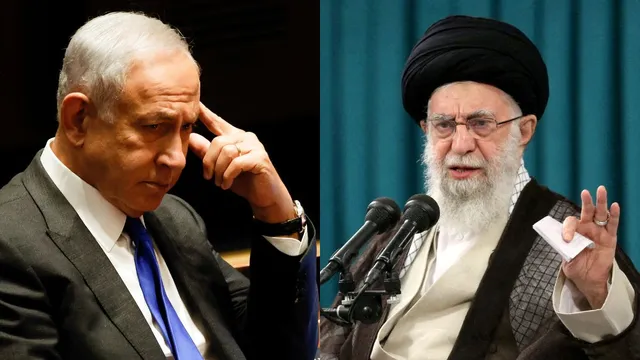- By Supratik Das
- Sat, 14 Jun 2025 02:26 PM (IST)
- Source:JND
Israel-Iran War Update: Pre‑dawn air‑raid sirens sounded over Tel Aviv and Jerusalem early Saturday following Iran's launch of another volley of ballistic missiles and Shahed‑series drones in retaliation for Israel's "Operation Rising Lion" on nuclear and military infrastructures deep within Iran. Israel's missile‑defence triad, Iron Dome, David's Sling, and Arrow, prevented most of the projectiles from striking land, but direct hits on apartment blocks killed at least three and injured dozens, as reported by emergency service Magen David Adom.
Tehran's retaliatory attack, code-named "True Promise 3", came in response to Israeli attacks that assassinated Revolutionary Guard commander-in-chief Hossein Salami, Armed Forces head Mohammad Bagheri, and several top nuclear scientists. The overt exchange is the most fierce direct combat between the two longstanding adversaries and already is causing shock waves throughout global economies and supply chains.
Five Major Impacts Of Israel-Iran War
Oil Prices Soar As Strait Of Hormuz Risks Increase
Global crude prices surged almost 9 per cent on Friday, with Brent reaching 78 USD a barrel, its highest since January, before settling at about 74 USD. The prices may rise up to USD 120 if conflict shuts or narrows the Strait of Hormuz, through which about one-third of seaborne oil and 20 per cent of LNG trade passes. This "Energy‑for‑energy" tactic, in which either side targets oil infrastructure, may escalate tensions further.
Regional Airspace Lockdown Clears Skies Over Iran
Iran, Iraq, Jordan, Syria and Israel all closed or severely restricted their skies within a few hours of the initial Israeli strike. Real-time Flightradar24 maps indicated a nearly complete evacuation of commercial traffic over Iran and nearby corridors. Israel briefly closed Ben Gurion Airport, and even US State Department and India has already issued security warnings for travelers throughout the region.
Long-Haul Flights Suffer Cascading Disruptions
With shortest trans‑Eurasian routes cut, airlines are now bound to divert to other routes. This is causing ripple effect on international aviation, with longer flights, potential delays and increased fuel costs. Air India alone diverted 16 services and had to turn back a Mumbai–London Boeing 777 after three hours in the air when Iranian airspace were unexpectedly shut. United, Delta, Emirates, Qatar Airways and others also cancelled or diverted a long‑haul route. This will create a hike in ticket fares and tangle global cargo schedules for weeks.
Deep Freeze Nuclear Diplomacy
Tehran called negotiations with Washington on its nuclear programme "meaningless" following the Israeli attacks, blaming the United States for implied acquiescence with Israel. A sixth round of talks due in Muscat this weekend now hangs by a thread, quashing hopes of any near‑term diplomatic talks.
Spills across multiple fronts of conflict
Missile fragments has fallen on the south of Syria, and Jordanian and Saudi fighter jets have downed drones over their territories, highlighting the danger of a wider regional conflict. Hezbollah rockets across Lebanon and Houthi threat utterances from Yemen have triggered new Israeli warnings, fueling fears of a further escalation.
Will India Feel the Heat?
India is most exposed to West Asia turbulence. Approximately two‑thirds of India's crude and nearly half of its LNG imports pass through the Strait of Hormuz. A prolonged blockade would increase India's current‑account deficit, drive retail fuel prices up and fuel inflation. This would gradually reduce India's GDP growth too. Higher freight rates and war‑risk insurance premiums are already filtering through shipping contracts. Indian civil aviation, meanwhile, faces longer trans‑Europe flight times and higher jet‑fuel bills.
The Directorate‑General of Civil Aviation has activated alternative routes, but officials concede that schedules and fares will remain volatile until regional airspace reopens fully. With neither Jerusalem nor Tehran signalling an immediate ceasefire, markets and policymakers worldwide are bracing for further turbulence. For India, the tension extends well beyond geopolitics, it touches every household through the fuel pump, the grocery bill, and the airline ticket counter.

